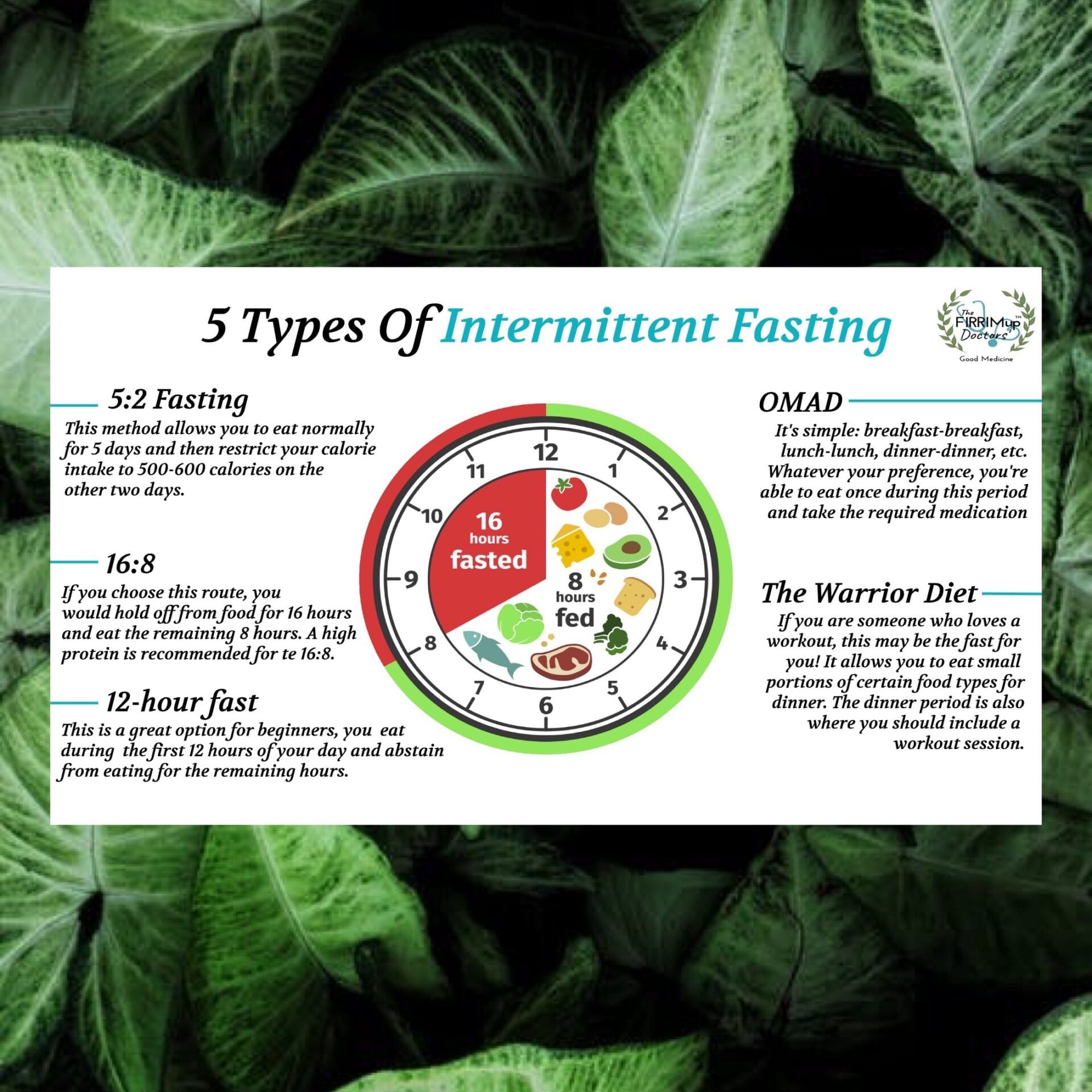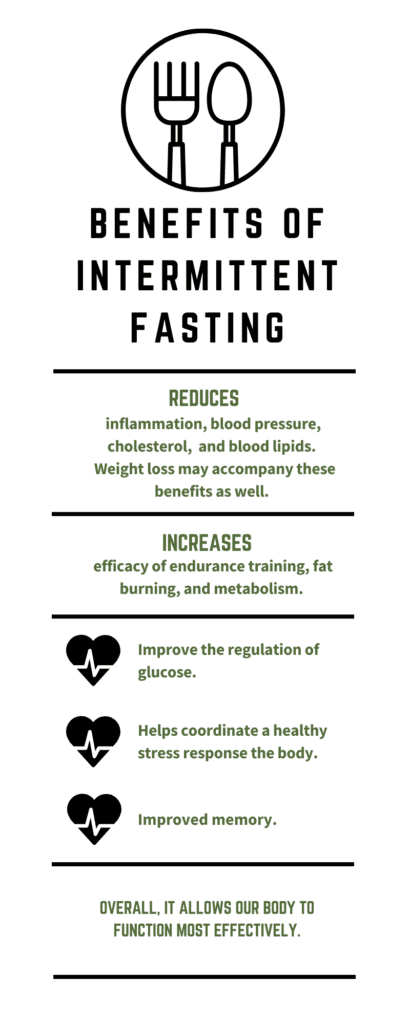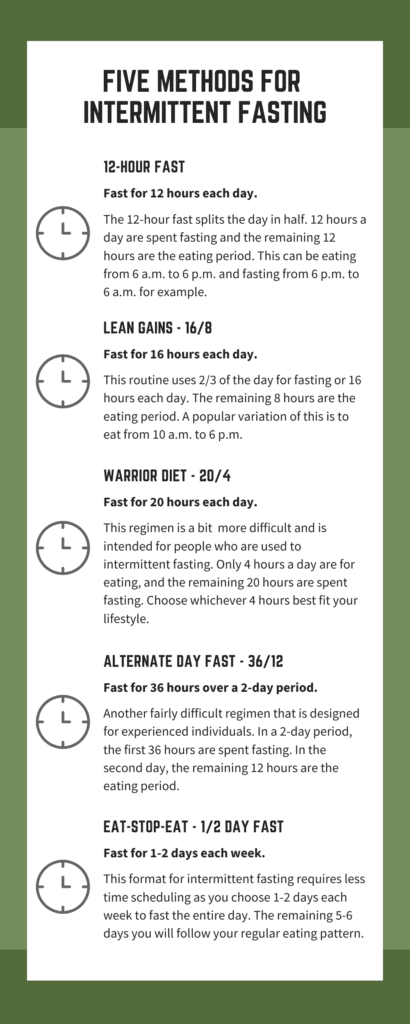Intermittent Fasting

Want to lose weight? Manage diabetes? Delay aging? Research indicates the key to these goals may be found in intermittent fasting. The concept of time restricted eating dates back hundreds of years and its benefits are backed by scientific studies. Intermittent fasting serves as an easy way to reap health benefits without making drastic lifestyle changes.
What is intermittent fasting?
Intermittent fasting can be described as a pattern of eating where you transition from periods of fasting (not eating or caloric restriction) to non-fasting (unrestricted eating). Animals collect their food and eat it shortly thereafter, unintentionally fasting for up to 20 hours before going to collect food again the next day. This restricted eating window creates remarkable outcomes because animals are able to rely on fat storage in the body for energy, rather than sugars coming from the food you eat. We all want to burn extra fat, don’t we?
Flipping the Metabolic Switch
Our bodies use different cellular pathways when you transition to extended periods of time without eating. This may sound detrimental, but it actually allows for repair and removal of damaged molecules. By transitioning from periods of fasting to non fasting you elicit cellular responses that improve mental and physical performance. Not only are there benefits when you are not eating, but it continues to occur even after you resume eating. When you eat, the glucose from the food is used for energy, and the fat from the food is stored in adipose tissue (fat tissue) as triglycerides. When you finish eating and begin fasting, the body begins to break down the triglycerides into usable forms of energy. In this sense, your body is breaking down the fat it has stored and using it for energy.
 Benefits
Benefits
One of the greatest benefits of intermittent fasting is that it allows our bodies to function how they were created. With the traditional “ Standard American Diet (SAD)” of 3 meals with 2 snacks, our bodies do not have time to process everything we put into it. With the constant intake of food, there is no break period that allows the body to cleanse and prepare for the next meal. Introducing a period of fasting in your diet provides the time your body needs to use the nutrients you give it, as well as time to “clean house.” When our bodies are not performing to their capabilities, one of the best things we can do to reset our body is to fast. The graphic below displays some of the other benefits to intermittent fasting.
How Do I Do It?
There are many variations of intermittent fasting that you can follow. Daily time restricted feeding is one popular method that has a few different variations. One variation that we commonly recommend is the 12-hour fast. It is possible that you are already doing this in your daily life without realizing it. If you eat breakfast at around 8 a.m. and finish eating dinner before 8 p.m., then you are participating in a 12 hour fast. As you get used to the feeling of restricted eating, you can build your way up to a 14 hour or 16 hour fast.  It is recommended to finish eating early enough in the day to ensure our body has time to process the food consumed before going to sleep. An example of this would be to eat during the time frame of 10 a.m. to 6 p.m. An added benefit to only eating for 8 hours each day is that your total calorie intake for the day will likely be lower than it was with unrestricted eating, even though you can eat as much as you want during the feeding window. Studies have shown that an overall reduction in calorie intake can increase your life-span.
It is recommended to finish eating early enough in the day to ensure our body has time to process the food consumed before going to sleep. An example of this would be to eat during the time frame of 10 a.m. to 6 p.m. An added benefit to only eating for 8 hours each day is that your total calorie intake for the day will likely be lower than it was with unrestricted eating, even though you can eat as much as you want during the feeding window. Studies have shown that an overall reduction in calorie intake can increase your life-span.
The graphic to the right displays 5 popular formats for intermittent fasting. With all of the different regimen choices, there is a variation for everyone. Choose which option fits your lifestyle and give it a try! It may be easier to follow than you think.
Some Things to Remember
- Always consult your physician before starting a new eating pattern or changing your diet.
- Make sure to start your eating window earlier in the day, if possible, to allow your body time to digest the food you have eaten before going to sleep.
- Ensure you are still meeting all of your nutrient needs even in the smaller eating time frame.
- Choose an eating pattern that fits your current lifestyle.
Are you a Gainesville local? Check out North Florida Integrative Medicine (Dr. Akey’s Practice) and come to a Group Medical Visit on Intermittent Fasting. You must be a current patient to attend. Please call 352-332-6680 to learn more!
For a Deeper Dive
If you are interested in intermittent fasting and want to take a closer look at the cellular processes that contribute to these amazing benefits, consider looking into these topics:
- Down regulation in the mTOR pathway (mammalian target of rapamycin)
- Down regulation in the IGF-1 pathway (Insulin-like growth factor)
- Stimulation of Autophagy
- Epigenetic modifiers resulting in the expression of genes associated with stress resistance and mitochondrial biogenesis
